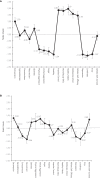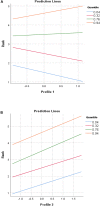Associations Between Psychological Profiles and Performance Success Among Professional Taekwondo Athletes in China: A Multidimensional Scaling Profile Analysis
- PMID: 32499737
- PMCID: PMC7242764
- DOI: 10.3389/fpsyg.2020.00822
Associations Between Psychological Profiles and Performance Success Among Professional Taekwondo Athletes in China: A Multidimensional Scaling Profile Analysis
Abstract
Sport psychology research has long sought to uncover the determinants of the optimal psychological state for peak performance. Persistent inquiries in this work include whether there is a set of ideal psychological and emotional factors that are required to achieve optimal performance and, if there are, what are they and how are they related to optimal performance. To answer these questions, the current study aimed to identify potential profiles of personality and emotional traits based on a sample of professional Taekwondo athletes from China. In addition, the study also aimed to examine the utility of the profiles in predicting successful athlete performance. Using multidimensional scaling (MDS) profile analysis, two latent profiles of personality and emotional traits were identified that indicate four subtypes of athletes. Regression analyses were conducted to examine how the identified profiles were associated with performance success. The results seemed to suggest that Taekwondo athletes with more performance success were more likely to have a profile of positive personality and emotional traits, while athletes with less performance success were likely to have somewhat elevated levels of self-control, extraversion, and aggression. Knowledge of athletes' personality profiles will help sport psychologists develop suitable interventions to enhance athletes' performance success. In concluding, the results are discussed in the context of athlete psychosocial development. The study added further evidence about the association between psychological and emotional factors and successful Taekwondo athletes.
Keywords: Taekwondo athletes; emotional traits; multidimensional scaling profile analysis; performance success; psychological profiles.
Copyright © 2020 Li, Ding, Fan, Shi, Guo and Yang.
Figures


References
-
- Aidman E. V. (2007). Attribute-based selection for success: the role of personality attributes in long-term predictions of achievement in sport. J. Am. Board Psychol. 3 1–18.
-
- Allen M. S., Greenlees I., Jones M. V. (2013). Personality in sport: a comprehensive review. Int. Rev. Sport Exerc. Psychol. 6 184–208.
-
- Anderson R., Hanrahan S. J., Mallett C. J. (2014). Investigating the optimal psychological state for peak performance in australian elite athletes. J. Appl. Sport Psychol. 26 318–333.
LinkOut - more resources
Full Text Sources
Medical
Research Materials
Miscellaneous

